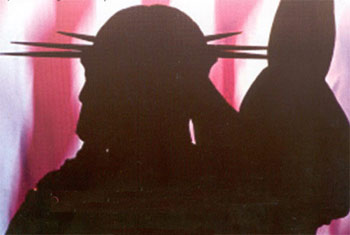|
On my desk, opened at
pages H2046-7, is the March 25, 1969 issue of the
Congressional Record. On the 121 pages that follow are
the names and hometowns of the 31,379 U.S. military
personnel who died in Vietnam during Lyndon B. Johnson's
presidency. I requested publication of the names,
because I wanted all Americans, especially my colleagues
on Capitol Hill, to recognize the war's enormous human
toll. It was part of my endeavor to bring U.S. troops
home without delay.
At the time, I was unaware
that several years earlier, Robert McNamara, Johnson's
secretary of defense, privately concluded that the war
could not be won. Despite that assessment, he did
nothing to end U.S. participation in combat. To the
contrary, he echoed Johnson's public assurances that a
light was discernible "at the end of the tunnel" in
Vietnam, although the defense secretary actually saw no
light at all. McNamara did not disclose his early
conviction that the war was unwinnable until he wrote
his memoirs years after the war ended.
After Richard Nixon
succeeded Johnson, the new president rejected calls for
an immediate pullout of U.S. troops. Instead he
announced Vietnamization, a policy of gradual withdrawal
of U.S. forces as recruits from South Vietnam became
available to fill the ranks. It was Nixon's way of
getting troops home "with honor." But combat continued
at a high level and so did casualties. When Nixon
resigned as president six years later, caskets were
still being shipped to America.
Both McNamara and Nixon
deserve dark entries in history books for letting U.S.
troops die in great numbers after the war was considered
lost. By the time all U.S. forces left Vietnam, more
than 16,000 additional names added to the 1969 roll of
war dead. At the threshold of their careers, these young
lives were snuffed out needlessly, a staggering loss to
our society that could have been averted by wise and
courageous leadership.
I mention this grim
footnote to history, because President Bush declares he
is intent on pursuing the U.S.-initiated war in Iraq
that every realistic observer must now recognize as
hopeless. He should know that the U.S. quest for the
hearts and minds of Iraqis, already barely discernable,
disappeared completely as soon as the pictures of U.S.
barbaric prison torture came into focus. The photographs
fueled new anti-American outrage worldwide. In Cairo, it
sent Sahar Sobeih, a young professional who was already
upset by the U.S. invasion of Iraq, into deep mourning.
Prompted by the deeply-felt, sibling-like bond that the
world's 1.2 billion Muslims feel for one another, she
lamented: "These are my brothers and sisters."
Despite what they say in
public, President Bush, Defense Secretary Donald
Rumsfeld and other senior U.S. officials must know that
the war is now unwinnable. They must summon the wisdom
and decency to order an immediate and total end to
combat operations. The main mission of our forces from
this day forward should be to avoid the death or injury
of even one more person, whether American or Iraqi. The
most honorable step our military forces can take is to
depart completely once a popularly-elected Iraqi
government is in place.
While a Member of
Congress, Abraham Lincoln called war "the most
oppressive of all kingly oppressions." For the sake of
Iraq and America, this latest oppression must be lifted.
The war in Iraq was wrongly conceived and poorly
managed. It will enter history books as a massive folly.
The list of the fallen in
Iraq was already too long when the first one died.

Paul Findley served as a
Republican Member of Congress, 1961-83. Since then, he
has lectured widely and written three books on the
Arab-Israeli conflict. He resides in Jacksonville,
Illinois. E-mail:
pfindley@myhtn.net ]
| 